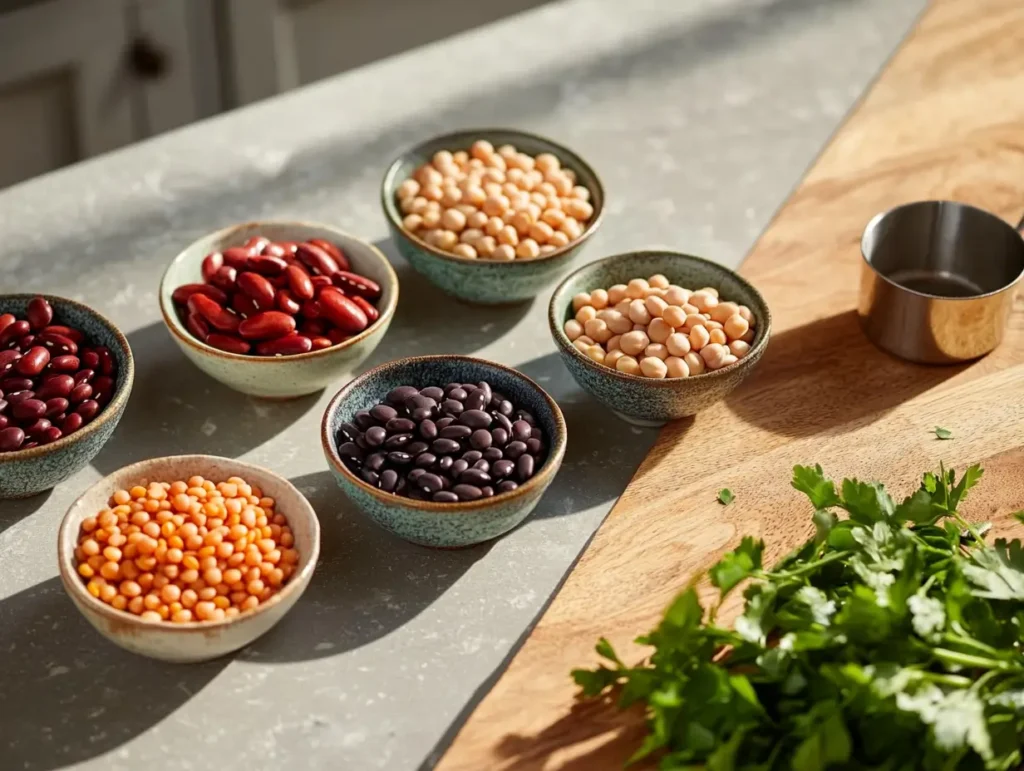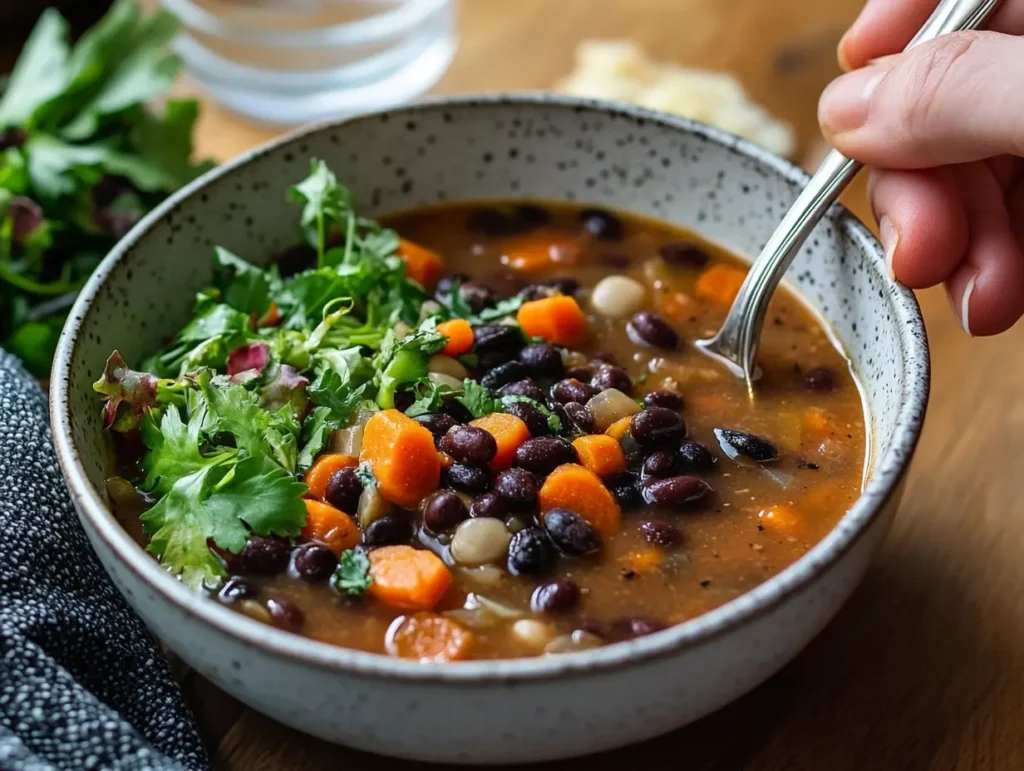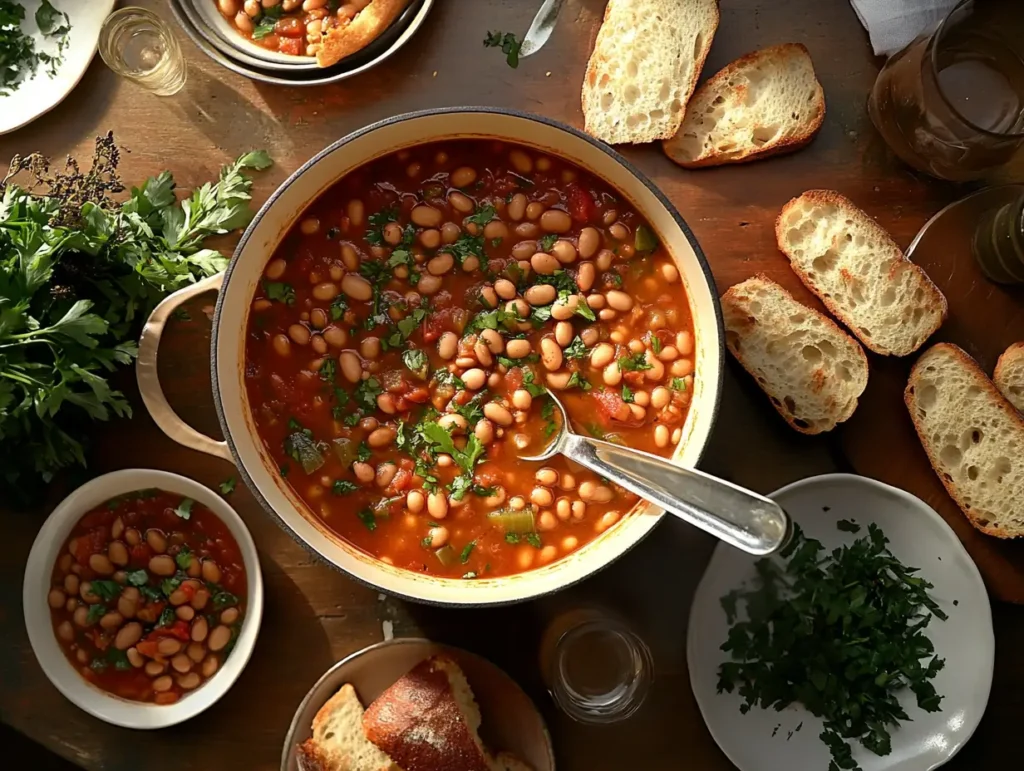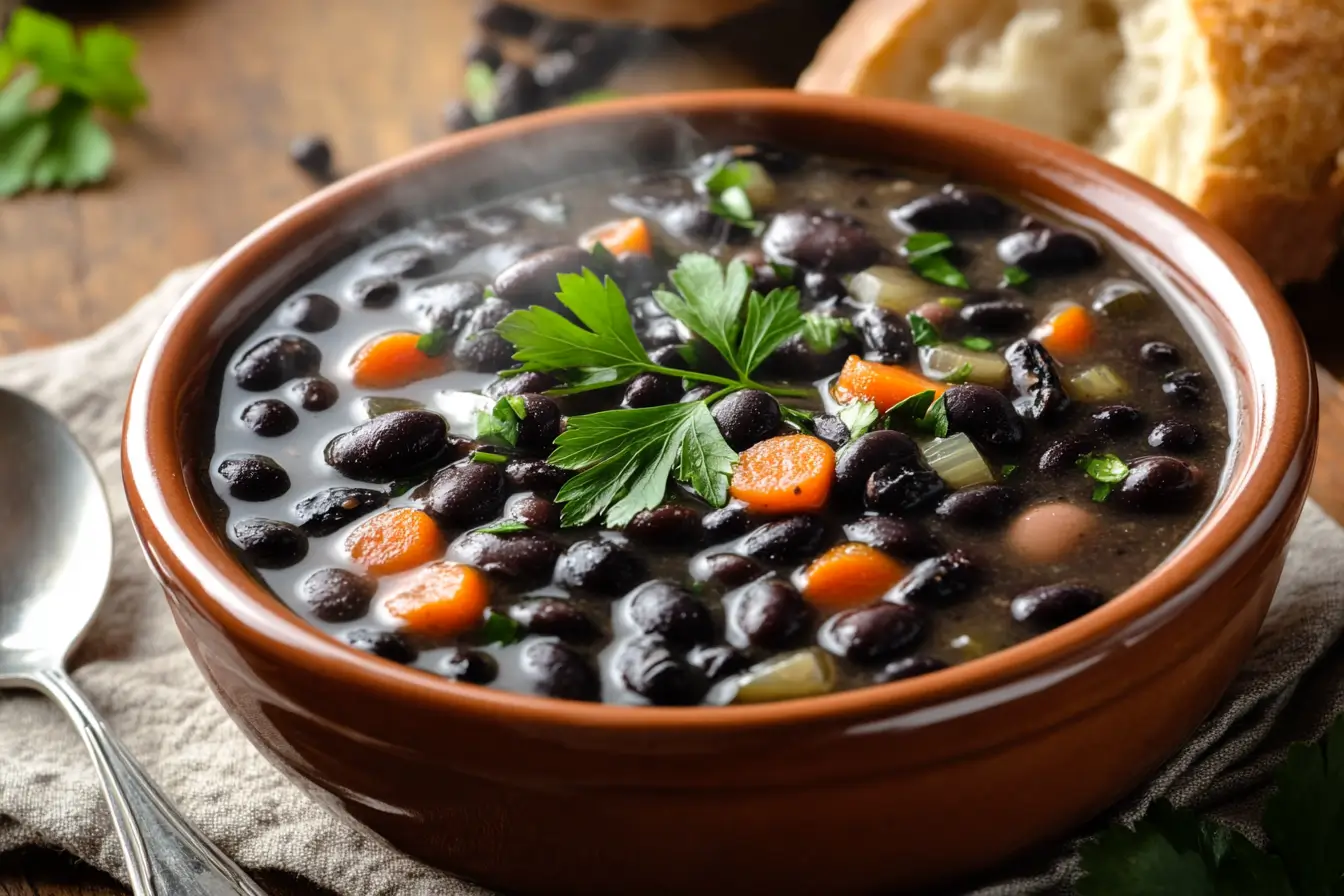Beans are a popular choice for nutritious meals, but is it healthy to eat bean soup every day? Many wonder if this daily habit is beneficial or if there are any downsides to consider. Packed with fiber, protein, and essential nutrients, bean soup is an excellent choice for those seeking a balanced and wholesome diet. But truly, is it healthy to eat bean soup every day as a consistent part of your meals? In this article, we’ll discuss the incredible benefits of eating bean soup daily, address any potential concerns, and provide tips for incorporating this nutrient-rich dish into your routine.
But the question remains: Is it healthy to eat bean soup every day? For many, this wholesome dish has become a daily ritual, offering a combination of comfort and nutrition. Beans are rich in fiber, protein, vitamins, and minerals, making them a go-to ingredient for anyone seeking a balanced diet. In this article, we’ll uncover the benefits of eating beans daily, explore their impact on your health, address potential concerns, and offer practical tips for incorporating beans into your meals.
By the end, you’ll understand why beans are considered a superfood and how eating bean soup every day could be a key to achieving better health.
Table of Contents
Is It Healthy to Eat Bean Soup Every Day? The Nutritional Facts
When it comes to nutrient density, beans stand out as a powerhouse food. Their combination of fiber, protein, and essential nutrients makes them ideal for maintaining overall health while being accessible to almost everyone.
Fiber-Rich Foods
Beans are renowned for their high fiber content. Just one cup of cooked beans can provide up to 15 grams of fiber, which is about half the daily recommended intake. Fiber is essential for promoting gut health, maintaining regular bowel movements, and supporting a healthy microbiome.
Fiber also helps manage cholesterol levels and blood sugar, two key factors in preventing chronic diseases. This makes beans an excellent choice for people managing heart health or diabetes.
Plant-Based Protein Sources
Beans are one of the best plant-based protein sources available. They’re particularly valuable for vegetarians, vegans, or anyone looking to reduce their meat consumption. Black beans, for example, offer about 15 grams of protein per cooked cup. This protein helps repair tissues, maintain muscle mass, and keep you feeling full for longer periods.
Vitamins and Minerals in Beans
Beans are a rich source of essential vitamins and minerals, including:
- Folate: Crucial for cell repair and especially important during pregnancy.
- Potassium: Helps regulate blood pressure and reduce the risk of stroke.
- Magnesium: Supports muscle and nerve function, along with bone health.
- Iron: Promotes oxygen transport in the blood and prevents anemia.
Additionally, beans are low in fat and calories, making them a smart addition to any weight management plan.
Antioxidant-Rich Foods
Certain beans, like black beans, are high in phenolic compounds that act as antioxidants. These compounds fight free radicals, reduce inflammation, and may lower the risk of cancer and other chronic illnesses.
When you combine all these nutrients, it’s easy to see why beans are often considered a cornerstone of a balanced diet.

Health Benefits of Eating Bean Soup Daily
How Eating Bean Soup Every Day Supports Digestive Health
One of the primary benefits of eating beans every day is improved digestion. As a fiber-rich food, beans encourage regular bowel movements and prevent constipation.
Heart Health Benefits of Eating Bean Soup Daily
Beans are particularly high in soluble fiber, which forms a gel-like substance in the gut. This substance slows digestion, allowing the body to absorb nutrients more efficiently. Additionally, soluble fiber ferments in the colon, producing short-chain fatty acids (SCFAs). These SCFAs feed good bacteria, improving the balance of your gut microbiome.
Tips for Digestive Comfort
To avoid potential discomfort like bloating or gas, soak dried beans overnight before cooking. This helps reduce oligosaccharides, compounds that are harder to digest. Using ingredients like kombu or adding spices such as cumin can also aid digestion.

Heart Health Foods
Eating beans daily can have a profound impact on cardiovascular health. Their combination of soluble fiber, potassium, and magnesium helps lower cholesterol, regulate blood pressure, and protect against heart disease.
Lowering Cholesterol
Soluble fiber in beans binds to cholesterol in the digestive system, helping remove it from the body. Studies have shown that individuals who consume beans regularly experience significant reductions in LDL (“bad”) cholesterol levels.
Supporting Blood Pressure
Potassium and magnesium, both abundant in beans, play vital roles in maintaining healthy blood pressure. Potassium balances sodium levels in the body, while magnesium helps relax blood vessels.
Beans are also free from cholesterol and saturated fat, making them an excellent choice for anyone looking to maintain heart health.
Can Eating Bean Soup Daily Help Manage Blood Sugar
Beans are known for their ability to regulate blood sugar levels, thanks to their low glycemic index. Foods with a low glycemic index release glucose slowly into the bloodstream, preventing rapid blood sugar spikes.
This makes beans particularly beneficial for people with diabetes or insulin resistance. The high fiber content slows digestion, ensuring a steady release of energy throughout the day. Adding beans to meals can help stabilize blood sugar and reduce cravings for unhealthy snacks.
Weight Management with Beans
If you’re looking to lose weight or maintain a healthy weight, beans are your ally.
How Beans Aid Weight Loss
Beans are filling and satisfying due to their high fiber and protein content. These nutrients work together to keep you full longer, reducing the likelihood of overeating. Beans are also low in calories, making them a guilt-free addition to any meal.
Replacing High-Calorie Foods
Using beans as a plant-based protein alternative to meat can reduce your overall calorie intake while still providing essential nutrients. For a quick and healthy meal, try this no-soak black bean soup recipe for a filling lunch or dinner option.
Are There Concerns About Eating Bean Soup Every Day?
Digestive Discomfort from Eating Bean Soup Daily
Gas and bloating are common issues when increasing bean consumption. This is due to oligosaccharides, a type of carbohydrate that can ferment in the gut. However, these effects are temporary and can be minimized.
Overconsumption: Is Bean Soup Healthy Every Day?
- Soak beans for at least 8–12 hours before cooking.
- Add digestive aids like ginger, bay leaves, or cumin to recipes.
- Gradually increase bean intake to allow your digestive system to adapt.
Antinutrients and Lectins
Some concerns about beans revolve around their antinutrients, such as lectins and phytates, which can interfere with nutrient absorption. However, proper preparation methods like soaking and cooking reduce these compounds significantly.
Additionally, the health benefits of beans far outweigh the minor effects of antinutrients, especially when consumed as part of a balanced diet.
Beans and Longevity
Beans are a key component of diets in “Blue Zones,” regions known for having some of the longest-living populations in the world. These include areas like Okinawa, Japan, and Nicoya, Costa Rica.
Why Beans Promote Longevity
- High fiber content supports gut and heart health.
- Antioxidants reduce inflammation and combat chronic diseases.
- As a low-cost protein source, beans contribute to a sustainable and healthful diet.
For inspiration, explore the benefits of black beans and how they’re used in these regions.
Practical Tips for Including Bean Soup in Your Daily Diet

Simple Recipes for Eating Bean Soup Every Day
Bean soup is one of the easiest and most nutritious ways to enjoy beans daily.
- Use dried beans for a cost-effective option.
- Add vegetables, herbs, and spices for extra flavor and nutrients.
- Check out this black bean soup recipe for a simple yet satisfying meal.
How to Make Bean Soup Easy to Digest
To maximize the benefits of eating beans, prepare them properly:
- Soak beans to reduce antinutrients and improve texture.
- Cook beans with fresh herbs like rosemary or thyme for added flavor.
- Use a pressure cooker for faster preparation, especially for harder beans like chickpeas or kidney beans.
Creative Meal Ideas
- Add beans to grain bowls with quinoa or rice for a balanced meal.
- Pair bean soup with leafy greens or roasted vegetables for a complete dish.
- Try making bean dips like hummus or black bean spreads for snacks.

Benefits of Eating Beans EverydayIs it healthy to eat bean soup every day?
- Total Time: 70 minutes
- Yield: 4 servings 1x
- Diet: Vegetarian
Description
Bean soup is a fiber- and protein-packed dish known for its impressive nutritional value and ability to support heart health, blood sugar balance, and digestion. But is it healthy to eat it every day? Discover the benefits and tips for daily enjoyment.
Ingredients
- 1 cup dried beans (or 1 can, rinsed and drained)
- 4 cups vegetable or chicken broth
- 1 onion, chopped
- 2 cloves garlic, minced
- 2 carrots, diced
- 2 celery stalks, chopped
- 1 tsp cumin
- 1 tsp paprika
- Salt and pepper to taste
- 2 tbsp olive oil
- Fresh herbs (thyme, bay leaf, or rosemary)
Instructions
- Soak dried beans overnight, then rinse and drain.
- Heat olive oil in a large pot over medium heat.
- Sauté onions, garlic, carrots, and celery until softened.
- Add beans, broth, and herbs to the pot.
- Season with cumin, paprika, salt, and pepper.
- Bring to a boil, then reduce to a simmer for 60–90 minutes until beans are tender (or 30 minutes for canned beans).
- Remove herbs and blend part of the soup if a thicker texture is desired.
- Serve hot, garnished with fresh herbs if desired.
Notes
To make beans easier to digest, always soak them and consider adding bay leaves or cumin while cooking. Bean soup is an excellent choice for daily meals due to its fiber, protein, and nutrient profile.
- Prep Time: 10 minutes
- Cook Time: 60 minutes
- Category: Soup
- Method: Stovetop
- Cuisine: Global
Nutrition
- Serving Size: 1 bowl
- Calories: 220
- Sugar: 4g
- Sodium: 450mg
- Fat: 6g
- Saturated Fat: 1g
- Unsaturated Fat: 5g
- Trans Fat: 0g
- Carbohydrates: 30g
- Fiber: 12g
- Protein: 12g
- Cholesterol: 0mg
Keywords: bean soup, healthy soup, daily meals, fiber, protein, plant-based
Potential Downsides of Eating Beans Daily
While beans are incredibly nutritious, some individuals may experience food sensitivities or digestive issues. For those with irritable bowel syndrome (IBS), consuming beans might trigger symptoms. However, experimenting with smaller portions and different preparation methods can help.
If you’re unsure, consult with a healthcare provider to determine the best approach for incorporating beans into your diet.
Conclusion for Is it healthy to eat bean soup every day?
In conclusion, eating bean soup every day is not only a nutritious choice but also a practical one for improving your overall health. Beans provide essential nutrients like fiber, protein, and antioxidants that support your digestive system, heart health, and weight management. Moreover, they are affordable, versatile, and easy to prepare, making them an excellent addition to any diet.
However, it is important to prepare beans properly to avoid potential digestive discomfort. Soaking beans, cooking them thoroughly, and introducing them gradually into your meals can make a significant difference. Furthermore, by combining bean soup with other nutrient-dense ingredients, you can create balanced and flavorful meals that you will enjoy every day.
For those wondering is it healthy to eat bean soup every day, the answer is a resounding yes when consumed in moderation and with variety. Ultimately, this simple yet powerful dish can transform your eating habits and help you achieve your health goals. Ready to get started? Try a flavorful recipe like the no-soak black bean soup and experience the benefits for yourself!
Ready to try a healthy, nutrient-packed dish? Learn how to make the perfect black bean soup in your Instant Pot and take your meals to the next level.
FAQs about Is it healthy to eat bean soup every day?
Can you eat bean soup every day?
Yes, eating bean soup daily is a healthy choice for most people. It provides essential nutrients like fiber, protein, and antioxidants that promote overall health.
How healthy is bean soup?
Bean soup is highly nutritious, offering a combination of vitamins, minerals, and plant-based protein. It’s a low-calorie, low-fat option that supports weight management, heart health, and digestion.
What is the best soup to eat every day?
The best soup to eat daily is one made with beans and vegetables. Black bean soup, for example, combines protein, fiber, and antioxidants for a well-rounded meal.
Is there any side effect of eating beans every day?
For some, eating beans daily may cause gas or bloating. However, soaking beans before cooking and gradually increasing consumption can reduce these effects. Beans are generally safe and beneficial for most people.

